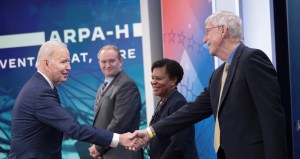Health Datapalooza: Data innovation five years later
It was nearly five years ago that an enlightened group of leaders first gathered at an obscure forum in Washington, D.C., hosted by the Institute of Medicine and the Department of Health and Human Services, to explore how big data could improve health care in America.
Propelled by an energetic new chief technology officer at HHS named Todd Park, the forum brought together innovators from all walks of the health care and IT communities. Their vision was to create a platform for harnessing health care data — analogous to how an entire industry arose around a steady government supply of National Weather Service data.
That initial forum, held June 2, 2010, rapidly snowballed into what today is better known as the Health Datapalooza, which is expected to bring more than 2,000 technology experts, entrepreneurs, policymakers and health care system leaders together in Washington at the end of the month.
It also gave rise to the Health Data Consortium, a public-private partnership which now manages the Health Datapalooza and works to promote the availability and innovative use of open, machine-readable health data.
And it later became a model for the White House — which recruited Park to serve as U.S. chief technology officer in 2012 — to showcase how freely available government data might fuel innovation and jobs in other fields including energy, public safety and education.
The challenge then, and now, for those working to unlock the value of all that data — especially government data — has been in trying to liberate oceans of data from the systems, applications and processes in which they were created, and allow it to become the raw material for other uses. But there also remains a slew of legal and policy hurdles that must be addressed if the economic and social benefits of data innovation are to be fully realized in the U.S.
A new report released this week by the Center for Data Innovation puts those hurdles into clearer perspective. In it, authors Daniel Castro and Joshua New lay out a dozen bipartisan recommendations for ways Congress might accelerate data innovation in the U.S.
These recommendations offer a constructive snapshot of the issues facing those who have a stake in the data economy – which is pretty much everyone these days, but in particular those who produce the data on which much of the U.S. economy depends.
A good example, and one that is especially relevant to those gathering at this year’s Health Datapalooza, is the need to adopt universal patient identifiers for health care.
While hospitals and health care providers have generally embraced electronic health records, they have yet to fully benefit from them because there is still not an accurate and efficient way to match patients to their records.
As Castro and New make clear, “Without a reliable patient matching system, providers must spend time manually matching patients; patients can be erroneously matched to the wrong records, and some records belong to a patient can be overlooked. Even a single organization with multiple computer systems may experience this problem where misidentification rates range from two to twenty percent.”
The Department of Health and Human Services “recognized the ‘urgent and critical’ need to create a system of unique patient identifiers almost two decades ago, and this need has only grown more severe since then,” they noted.
While the original language of the Health Insurance Portability and Accountability Act, or HIPAA, identified the need to create a national universal patient identifier system, subsequent legislation blocked funding for enacting such a program. Congress can and should change that.
Similarly, educators, school administrators, researchers, families and prospective college students could gain enormous value from education data.
Unfortunately, many of these data sets are fragmented, vary by state, are often not publicly accessible, or aren’t interoperable. For instance, while 43 states link K-12 education data with early childhood data and 44 states link K-12 data with postsecondary data, only 19 states link K-12 data with workforce data and only 18 states link all four categories of data, according to Castro and New.
Once again, the creation of a reliable system to ensure that a “de-identified student record could be tracked over time” could provide much greater insight in “analyzing things like the impact of early-childhood education on the workforce,” they wrote.
Castro and New offer up a number of other recommendations — improving the management of geospatial data, clarifying financial regulatory data requirements, taking advantage of new data technologies to modernize supply chains, and letting consumers access their energy data from smart meters. Their recommendations are worth reading and advancing.
Innovators, of course, aren’t going to wait for Congress or federal policymakers, nor should they.
That was the genius behind the first Health Datapalooza. It served as an innovative way to circumvent the bureaucracy and inertia that has kept data captive, working as a catalyst that brought data users and producers together in the same room with business-minded developers to reimagine how data can be put to smarter use.






